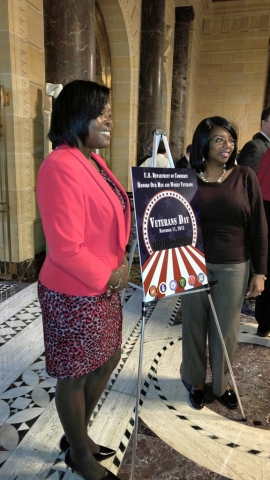Feb252016
Posted at 9:03 AM
Ed. note: This post is part of the Spotlight on Commerce series highlighting members of the Department of Commerce and their contributions to the Open for Business Agenda
Guest blog post by Tinisha Agramonte, Director for the U.S. Department of Commerce’s Office of Civil Rights
Black History Month (BHM) to me is an opportunity to discuss the role that Americans of African descent played in shaping American history. Specifically, it is a time to increase awareness of the notable achievements and contributions of African Americans in every facet of American society. Equally important, it is a time to deepen our understanding of their struggle to gain civil rights-- freedoms and rights to legal, economic, and social equality. BHM allows us to pause and reflect on the past, the progress made, and focus on the future work that has to be done.
So, is there a connection between Civil Rights and Commerce’s mission? Absolutely!
The Commerce Department’s Strategic Plan is about keeping America Open for Business. The work I do in my role as the Director for Commerce’s Office of Civil Rights is fundamental to accomplishing the goals and objectives outlined in the Strategic Plan. As an advisor to the Chief Financial Officer and Assistant Secretary for Administration and the Bureau Civil Rights offices, I am responsible for assuring that Commerce consistently and effectively complies with various civil rights statutes and related Executive Orders that prohibit discrimination in employment, and also in federally assisted programs and in the federal government’s own programs and activities.
My team and I lead programs and initiatives that ensure Commerce's programs, services, and activities, as well as those of organizations funded by Commerce, are open and accessible to all members of our society who want to do business, regardless of gender, disability, age, race, color, or national origin. We also work hard to ensure Commerce’s employees work in an environment that is free from discrimination. In order to drive progress in the Department’s five priority areas, Commerce recognizes that equal employment opportunities (EEO), diversity, and inclusion are necessary to build a high performing, diverse workforce that is empowered, engaged, and postured to effectively achieve operational excellence.
In his 2015 African American History Month Presidential Proclamation, President Obama stated, “slowly, we renewed our commitment to an ideal at the heart of our founding: no matter who you are, what you look like, how modest your beginnings, or the circumstances of your birth, you deserve every opportunity to achieve your God-given potential.” For many in Commerce who may not have had traditional career or educational paths, including myself, this sentiment brings to bear the importance of extending equal opportunities to all. Equal opportunities can only become a reality when people who have the power to hire, promote, develop, and empower employees perceive that members of all groups are capable of making meaningful contributions to our society and our respective agency missions.
When I was 20 years old, I was fortunate to have had a life changing experience in Junior college. At that time, I had a habit of hanging out in the student union with friends and skipping classes. During one of these times, one of my professors, Dr. Crawford, walked up to the table I was sitting at and asked to speak with me. I was nervous because I had just skipped his morning class and thought he was going to chastise me. Instead, he asked, “Why are you wasting your gift?” He told me that I had outstanding public speaking skills and I was a critical thinker. He went on to say, “it is time for you to move on from here and attend a 4-year university.” Finally, he said, “Too many have lost their lives for you to enjoy the opportunities you have. Don’t let their sacrifices go in vain.” That conversation was life altering and was a game changer.
Immediately following our conversation, I started my journey to honor the legacy of those that came before me. I completed undergraduate and graduate studies. I also went on to serve in various EEO, civil rights, and diversity and inclusion leadership positions as a civil servant, consultant, university instructor, and trainer in England, Japan, Germany, and stateside. My career trajectory was made possible because throughout my career, there were other “Dr. Crawfords” who encouraged me along the way. I have learned that “raising your hand” when an opportunity presents itself is important. However, simply raising your hand when there is an opportunity is not enough. There are two other key factors involved. First, you have to be prepared--possess the requisite competencies--to take on the opportunity. Second, someone has to be willing to acknowledge your raised hand.
Because of my life experiences, I am compelled to “pay it forward” by working in the Civil Rights arena. In my official capacity, I serve or participate on a few councils, including the OPM’s Hispanic Council on Federal Employment, the President’s Council for People with Intellectual Disabilities, and the United States Access Board. Additionally, to fulfill my own personal commitment and desire to develop diverse public servant leaders, I serve as a mentor for various organizations’ mentoring events or programs, which are aimed at developing aspiring senior executive service members. Those organizations include National Association of Hispanic Federal Executives, Equal Employment Opportunity Commission ( SES Executive Women Mentoring Event), and the League of United Latin American Citizens. I am also a member of Alpha Kappa Alpha Sorority, Incorporated, the first sorority founded by African American College Women in 1908 at Howard University.
I am honored every day to work with my Commerce colleagues to implement inclusive practices that allow all employees and customers to realize their full potential.




